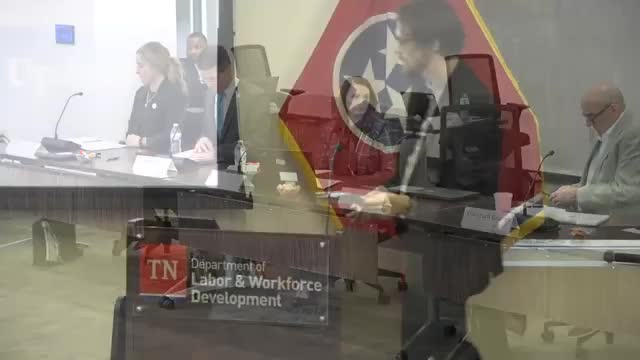State workforce board approves $11 million state reserve budget, calls for position on federal funding formula; adopts eight policy updates
Get AI-powered insights, summaries, and transcripts
Subscribe
Summary
Board approved a program-year 2025 state reserve funds budget estimated at $11 million, voted to ask staff to draft a position statement on federal workforce funding allocations, and adopted eight revised or new workforce policies by roll call.
The Tennessee State Workforce Development Board approved a program-year 2025 state reserve funds budget on Tuesday and instructed staff to draft a position statement on the decline and distribution of federal workforce funding.
Brian Erdley, director of budgeting and reporting at the Tennessee Department of Labor and Workforce Development, told the board the department’s authorized funding as of December 2024 was about $237,000,000 across workforce services, adult education and vocational rehabilitation. Erdley said carryover funds totaled roughly $77,000,000 and new revenue about $89,000,000; discretionary awards awarded since 2023 total about $21,000,000, including a $6.4 million rural initiative interagency agreement with TennCare and a $1 million interagency amount for Tennessee Works. He warned that formula (Title I) allocations have declined substantially: Tennessee received about $60.5 million in 2017 and is estimated to receive roughly $37.8 million for the coming program year, a decline of roughly 40 percent.
Erdley presented a state reserve funds budget that combines carry-in and new revenue and totals approximately $11 million, including $4.6 million earmarked for agency priorities, $3.1 million for economic development (ECD deals such as Blue Oval City/Bosc), about $2.3 million for systems administration and maintenance (case management and grants systems), and encumbrances for program evaluations and monitoring. The board moved to approve the reserve budget; the motion passed on a voice vote.
Separately, board members voted to ask Executive Director Amy Mayberry and the executive committee to draft a position statement on the condition of federal workforce funding and the allocation formula used to distribute WIOA funds. Commissioner Denise Thomas and others told the board the allocation formula uses metrics (including unemployment) that have disadvantaged Tennessee despite the state’s rapid economic growth; members said a position statement would be used to brief the governor’s office, the federal delegation and industry associations.
The board also conducted a series of roll-call votes and adopted eight revised or newly required policies to ensure compliance with federal guidance and to provide local flexibility. The policies approved (each adopted by roll call) were: - One-Stop System Design (adopted; roll-call result recorded as 22 in favor, 0 opposed, 4 abstentions, 6 absences) - Minimum Participant Cost Rate (MPCR) updates, including incorporation of incumbent worker training into the calculation (adopted; roll-call 22-0 with 4 abstentions) - One-Stop Operator and Service Provider Procurement (adopted; roll-call 22-0 with 4 abstentions) - One-Stop Certification (adopted; roll-call 22-0 with 4 abstentions) - Corrective Actions and Sanctions for Noncompliance (adopted; roll-call 22-0 with 4 abstentions) - Title I Grievance and Complaint Procedures (new, adopt to meet USDOL requirement; adopted; roll-call 22-0 with 4 abstentions) - Employment Service/Employment-Related Complaint System (Title III complaint process; adopted; roll-call 22-0 with 4 abstentions) - Referral process for serving veterans and other eligible persons by American Job Center staff (adopted; roll-call 22-0 with 4 abstentions)
For several policies, board staff noted there were local-board members who abstained because of local board affiliations; the transcript lists repeated abstentions from the proxies for Southwest and Southeast local boards and other named members in the roll-call records. The board’s oversight committee led the policy updates and emphasized that revisions were intended to increase local flexibility while meeting federal compliance requirements.
Other operational updates included presentations to the Operations Committee on conversion rates and a new automated outreach/referral effort using the Zendesk platform. Staff reported conversion-rate improvements (from 24.3% to 39.2% since measurement began) and increased co-enrollment between Title I and Title III; Zendesk outreach has sent roughly 67,000 automated emails since mid-2024 with a reported 3.63% response/click rate, which staff said is consistent with industry norms when combined with readership metrics.
Board members asked staff to return with more details on implementation steps for Tennessee Works, further budget detail, and the drafted federal funding position for review by the executive committee before coming back to the full board. Minutes from the prior meeting were approved at the start of the session.
Votes at a glance - Minutes from previous meeting: approved (voice vote). - Program Year 2025 state reserve funds budget (total ~ $11,000,000): approved (voice vote). - Motion directing staff to draft a position statement about federal funding allocation for WIOA/Title I: approved (voice vote). - Eight policy adoptions (listed above): each adopted by roll-call (see tallies above).
